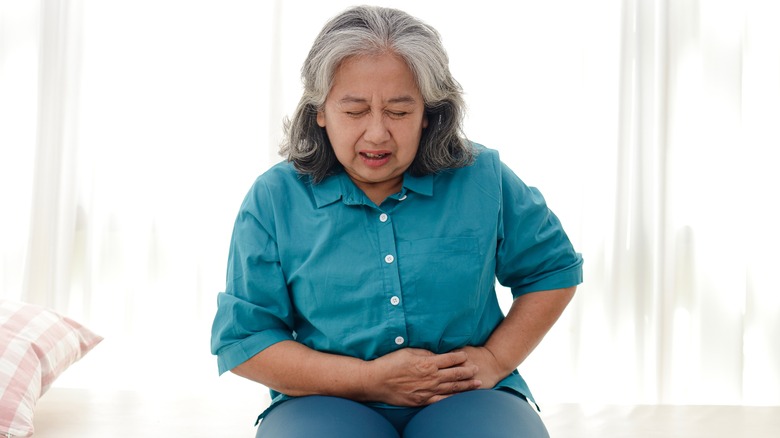When Should You Seek Medical Attention For Gas Pain?
Flatulence is one of the many functions of the human body. In fact, it's perfectly healthy to pass gas anywhere from 10 to 20 times each day, reports Harvard Health Publishing. Gas is a byproduct of the natural digestive process. It occurs when bacteria goes to work breaking down the food we eat. Made up primarily of methane and hydrogen, it's the hydrogen sulfide that's responsible for the unpleasant aroma that sometimes accompanies our, well — farts.
The different kinds of foods we eat also play a role in the amount of gas we produce, as well as any related gas pain. Such foods that increase gas production include garlic, onions, and wheat, as well as beans and lentils, as these are more difficult for the body to break down. For others, dairy may be the source of their gastrointestinal discomfort. Symptoms such as belching, passing gas, pain, cramping, bloating, or distention in the abdomen can all be signs of gas pains. While most instances of gas pain are short-lived, there are cases in which it may indicate a possible health condition.
When gas pains could point to a health condition
In addition to eating foods that are more challenging for the body to digest, certain everyday behaviors can also increase how much gas we're producing. These behaviors primarily involve swallowing excess air, like when chewing, drinking, smoking, or wearing ill-fitted dentures (via Cleveland Clinic). Even the types of utensils we use when eating can be a contributing factor. "A lot of times, when people are eating soup or something liquid with a spoon, they tend to swallow more air," Dr. Brian van der Linden, an HCA Healthcare gastroenterologist, tells Doctors Hospital of Augusta.
However, in cases where gas pain is accompanied by additional symptoms, it can potentially point to a health condition, such as ulcerative colitis, celiac disease, or Crohn's disease (via Harvard Health Publishing). Ulcerative colitis is a condition characterized by inflammation of the large intestine (per Crohn's and Colitis Foundation). Similarly, Crohn's disease causes ongoing inflammation of the gastrointestinal tract. Celiac disease, on the other hand, occurs when the ingestion of gluten triggers the body to attack the small intestine lining, explains Doctors Hospital of Augusta.
Treatment and prevention for gas pains
In addition to gas pains, if you find yourself experiencing constipation, diarrhea, ongoing nausea or vomiting, weight loss, bloody stool, or changes in the consistency or frequency of bowel movements, be sure to consult with your physician. In the event of chest pain or prolonged abdominal pain that occurs alongside gas pain, you'll want to seek prompt medical care.
If required, your doctor can perform various tests to determine if your gas pains may be due to a health condition. These include blood tests, a breath test, colon screening, or a gastrointestinal tract (GI) exam. Depending on the cause, your doctor may prescribe antibiotics or other medications. For gas pains that only pop up here or there, however, over-the-counter (OTC) products such as Beano, Pepto-Bismol, Gas-X, or Culturelle probiotics may prove helpful in relieving gas and related discomfort (via the Cleveland Clinic).
Additionally, remembering to chew slowly and thoroughly, refraining from chatting while eating, drinking through a straw, and reducing one's intake of carbonated drinks and chewing gum can also help keep unwanted gas at a distance.



